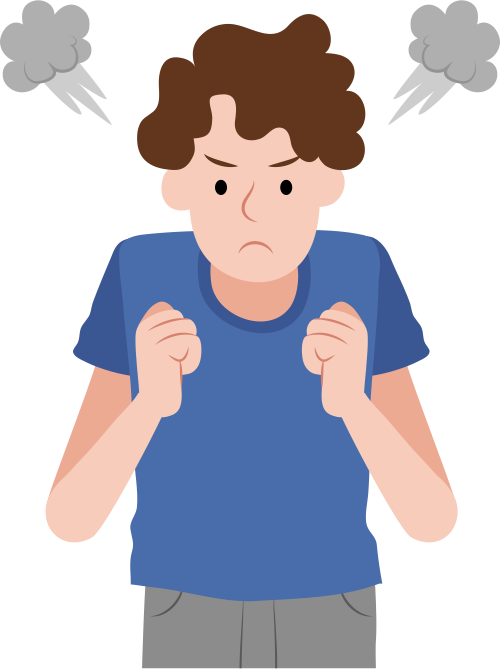What is anger?
-Anger is an intense emotion typically characterized by feelings of stress, frustration, and irritation. It becomes a problem when it’s excessively displayed and begins to affect your daily functioning and the way you relate with people.
-Anger could be a reaction to physical pain, a response to feelings of fear, to protect yourself from a perceived attack, or in response to a frustrating situation.
-Anger can range in intensity, from a slight annoyance to rage. It can sometimes be excessive or irrational. In these cases, it can be hard to keep the emotion in check and could cause you to behave in ways you wouldn’t otherwise behave. Sometimes we use anger to replace other emotions we would rather not deal with, like emotional pain, fear, loneliness, or loss.

-Anger does not look the same for everyone as we all express it differently. For some people, screaming might be an outlet for their anger while others might express it by physically hitting an object or even another person.
Anger can be caused by either external or internal influences. You might feel angry when you are emotionally hurt, threatened, in pain, or in a confrontation.
-Anger is a completely normal and typically healthy emotion. However, it can be detrimental to both your emotional and physical health when you lose control of it. When you are angry your body goes through some physiological and biological changes.

Ways in which anger affects our bodies:-
⦁ Raised blood pressure
⦁ Spike in hormones like adrenaline and noradrenaline
⦁ Increase in body temperature
⦁ Increased muscle tension
It can also lead to –
⦁ High blood pressure
⦁ Depression
⦁ Anxiety
⦁ Insomnia
⦁ Substance abuse
⦁ Gastric ulcers
⦁ Irritable Bowel Syndrome
⦁ Diabetes

Anger is a normal human emotion, but it’s important to find healthy ways to express it so as not to alienate people around us. Expressing anger healthily is also important for your mental health.
Anger can also be expressed in either one of two ways: verbally or nonverbally.
⦁ Verbally: When a person expresses their anger verbally, you are likely to see them raise their voices. They might become insulting and say hurtful things if their anger is directed at another person.
⦁ Nonverbally: You’ll notice some slight physical changes in a person who expresses their anger nonverbally. They might frown or scowl and clench their jaws and fist. They might also lash out at another person or object, sometimes causing physical damage to the person or object and in some cases even hurting themselves or others.
Ways to deal with Anger
Therapy- If you are experiencing frequent and intense bursts of anger that are causing physical and emotional damage to you or the people around you then you might need professional help with dealing with your anger.
Identify the Cause: The first step to coping with anger is identifying the root cause of your anger. It could be another emotion—maybe one of fear or loneliness. It could be an altercation you had or an unpleasant thought that came to mind.
Therapies- Such as Trauma Tapping and Havening Techniques, Rapid Eye Movement Techniques.
Work Out: Exercising isn’t just great for your physical health—it’s also beneficial for your mental health. It’s also a way to channel out emotions like anger in a useful and productive way. Going for a quick run or swim when you are angry could help defuse the emotion.
Let It Out: Don’t bottle your anger up. Expressing your anger when you feel it is the healthiest way to get through it. Bottling up the emotion is most likely to cause a sudden and intense outburst when you least expect it.
Avoid Triggers: If you are quick to become angry, it’s useful to try to identify and avoid your triggers. If you are often triggered when having a conversation with a particular person or about a particular topic, avoid them or that topic until you’ve learned how to have better control over your anger.



Recent Comments